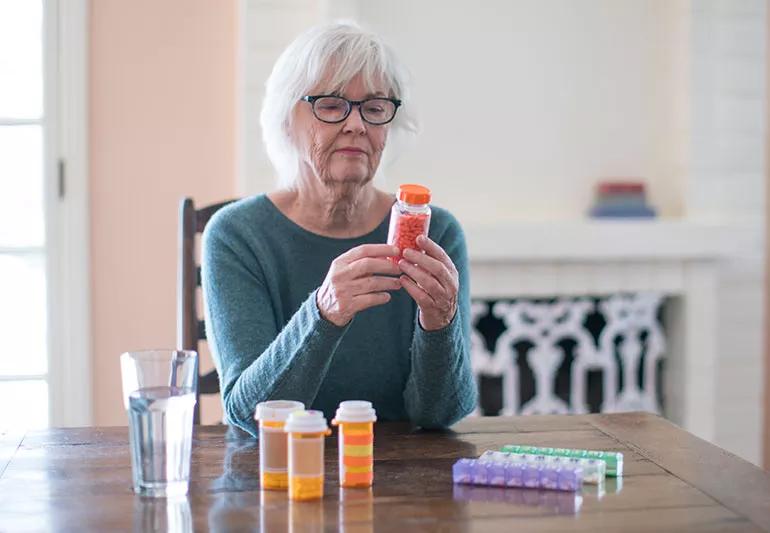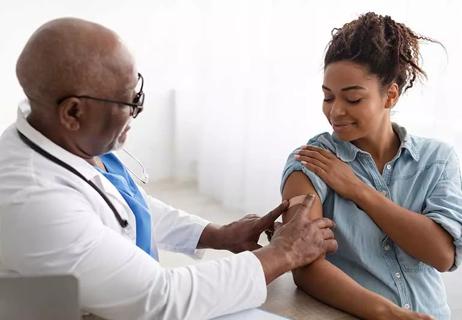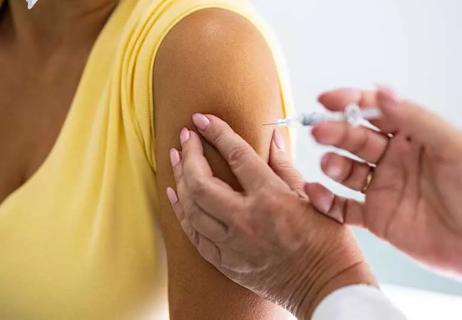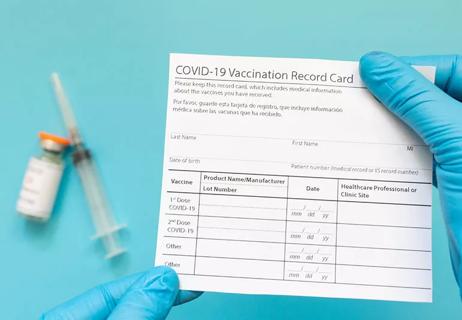Advertisement
If you’re not sure, talk to your healthcare provider — first

Since the arrival of the various COVID-19 vaccines, there have been reports of unique immune responses triggered by these vaccines. In other cases, the vaccine has set off a sort of chain reaction and affected other procedures or treatments.
Advertisement
Cleveland Clinic is a non-profit academic medical center. Advertising on our site helps support our mission. We do not endorse non-Cleveland Clinic products or services. Policy
For example, it’s recommended that dermal fillers be scheduled either two weeks before or after getting vaccinated because a few people experienced facial swelling during Moderna’s phase three trial.
Another recent discovery was that both the Pfizer and Moderna COVID-19 vaccines can cause lymph nodes in your armpit to swell, especially on the side where the shot was administered. This swelling has been mistaken as breast lumps by many. The Society of Breast Imaging has since recommended scheduling a mammogram before getting the first dose of the vaccine or four to six weeks after getting the second dose as long as it won’t disrupt routine care.
These are just a few examples. But since we’re learning new things about the vaccines and COVID-19, do we need to worry about other treatments or medications causing minor issues? Family medicine doctor, Neha Vyas, MD, says there aren’t too many things that we need to worry about.
“What’s going on is that we want a robust immune response from the COVID-19 vaccine. So anything that would interfere with it should be avoided,” says Dr. Vyas.
The effectiveness of the vaccine all comes down to how well your immune system responds to it. Dr. Vyas adds that if your body is focused on doing something else, it’s not going to spend the time necessary to build up that robust response to the COVID-19 vaccine.
Advertisement
According to Dr. Vyas, medications for blood pressure, diabetes, asthma and other common health conditions aren’t things to be concerned about.
“The studies for the vaccines were done with a number of people who had many of these common conditions. If you have hypertension or another common medical condition, you can have a little more peace of mind knowing that they did studies and trials on the COVID-19 vaccines which included people with the same conditions. The good news is that they responded well to the vaccines. So, don’t change any of your regular medications,” she says.
We still don’t have much information regarding the safety and efficacy of COVID-19 vaccines when they are administered with other vaccines. If you’re due for your shingles vaccine or another immunization, the CDC recommends a 14-day buffer between shots.
This means if you get a dose of Shingrix, you’ll need to get your COVID-19 vaccination 14 days later. Or, if you get vaccinated for COVID-19, you can schedule your other immunization dose two weeks out from that day.
Dr. Vyas says of course in an emergency, it’s OK to disregard the 14-day rule.
“As with everything in medicine, there are certain exceptions,” she says.
For example, say you step on a rusty nail and you need a tetanus shot. There’s no way that you should wait on a tetanus shot, even if you received a COVID-19 vaccine two days prior, says Dr. Vyas. Rabies is another example, or say there’s another measles outbreak in a community and everybody needs to be immunized.
“With any emergency, you need to make sure to get whatever the recommendation is. It doesn’t matter if every person was vaccinated for COVID-19 and they all haven’t reached the 14-day mark. Everyone should still get the recommended vaccine. So, emergencies like these are exceptions,” she clarifies.
The CDC also states that if a COVID-19 vaccine is given within 14 days of another vaccine, it’s not necessary to repeat either vaccine. You should complete your vaccine schedules as they were originally planned out.
Dr. Vyas recommends being very careful with steroids. If you’re on steroids for a chronic condition, it’s fine to keep taking them. But if you’re considering steroid injections, she suggests holding off until after you’re vaccinated.
If you’re on chronic steroids, Dr. Vyas says to continue to take them as needed. If you have any questions, talk to your healthcare provider. But if you have a choice of starting a steroid right before your COVID-19 vaccination, you’ll want to wait.
Advertisement
“For instance, say you’re considering a steroid injection in your back. You’ll want to wait about two weeks after you get your COVID-19 vaccine before doing so. But again, you have to look at the risk and benefits. If you are in excruciating pain and you can’t walk — and you can be at risk for getting a blood clot if you don’t walk — then get the steroid injection,” she says.
She also adds that with certain therapies, it’s good to talk to your healthcare provider about what you should do before your vaccination appointment.
“Cancer therapies, immune suppression or if you have a rheumatologic disease and you need certain shots or injections every month, don’t put those off. Talk to your provider about when it would be safe to get the COVID-19 vaccine because there are always exceptions to every rule.”
The FDA recommends making your provider aware if you have any of the following conditions:
You might be tempted to take aspirin, ibuprofen or another pain reliever before your vaccination appointment. Dr. Vyas says that is a major don’t. While you may be looking to protect yourself from potential symptoms of the immune response, you’d be doing more harm than good.
Advertisement
“We generally say wait until after you get your COVID-19 vaccination to take an anti-inflammatory medication. If you take one before, there’s a possibility that it could blunt the immune response to the vaccine. This is also true for many other vaccines. You can take a pain reliever after you get vaccinated and hydrate all you want. But don’t take anything before your appointment.”
Advertisement
Learn more about our editorial process.
Advertisement

Children as young as 6 months should get vaccinated, but dosage guidelines depend on kids’ ages and past vaccines

Updated vaccinations are recommended to better protect against the evolving virus

Redness, swelling, itching and rash can happen when your body’s immune system reacts to the vaccine injection

The latest vaccine offers the most up-to-date protection

Irregularities in cycle length and flow aren’t a cause for concern

Before you panic, here are the options to consider

Our expert explains why swollen lymph nodes happen

And why you shouldn't be so quick to post your COVID-19 vaccine card on social media

If you’re feeling short of breath, sleep can be tough — propping yourself up or sleeping on your side may help

If you fear the unknown or find yourself needing reassurance often, you may identify with this attachment style

If you’re looking to boost your gut health, it’s better to get fiber from whole foods